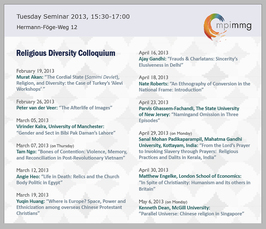"The Cordial State (Samimi Devlet), Religion, and Diversity: the Case of Turkey’s ‘Alevi Workshops’ "
Religious Diversity Colloquium Spring/Summer 2013
- Datum: 19.02.2013
- Uhrzeit: 15:30 - 17:00
- Vortragender: Murat Akan (Bosphorous University)
- Ort: MPI-MMG, Hermann-Föge-Weg 12, Göttingen
- Raum: Conference Room

For more details please contact vdvoffice(at)mmg.mpg.de.
The debates on citizenship ignited by the “challenge” of diversity, still poses the debate between the different-blind liberal idea of universal equal citizenship and a multiculturalist challenge. It takes the multiculturalist challenge as a sociological fact; either caused by immigration, or assimilationist nation-state policies, or capitalism. In fact, in many formulations of the debate an explicit and distinct problematization of the state, capitalism and liberalism are absent. This formulation of the question points out certain research directions more than others, and creates its own conceptual dichotomies parading in academic literature as if in need of no empirical (re)grounding in specific contexts. Foremost of all, the question of group definitions is treated as exogenous to the discussion, bequeathed from certain sociological research or assumed under some kind of essentialism (e.g. cultural, religious, national). This lecture shifts the focus to one object of analysis it finds relatively under theorized in this debate, “the state.” I look at an instance of a government project to address the “problems of a specific group of citizens” through dialogue in the name of further democratization. In 2009, Turkey’s ruling Justice and Development Party (AKP) initiated a series of reach-out meetings called “National Unity and Brother (Sister) hood (Milli Birlik ve Kardeşlik Projesi)” as further democratization (demokratik açılım). The Alevi workshops were part of this larger project. A focus on the “nut and bolts” of the “structuring power” of the government, at the least, raises many questions against the pillars of the “multiculturalist challenge” thesis and also contributes to further thinking along the lines of an “anthropology of the state.”